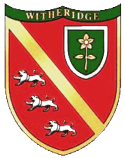

|
Sergeant E S Ayre - Devonshire Regiment September 12th 1914: The Square in the centre of the old market town of Witheridge was the scene of a remarkable demonstration on Thursday evening. Drawn together by the announcement of a meeting on the subject of "The War and our Country's Call" about 300 people assembled, chiefly men. Among those standing in the Square around a wagonette, which served as a platform for the speakers, were Sir Ian Heathcoat Amory, Mr W C L Unwin, J.P., Mr W. Lake, Mr Carter, etc. The Vicar, the Rev J P Benson presided, and in introducing the speakers, referred to the crisis as the most serious which the nation had ever been called upon to pass through. Mr L Mackenzie J.P., C.C., spoke next, pointing out that the war was brought about by the overweening ambition of Germany, and that it would have been impossible for Great Britain to have held aloof and allowed Belgium and France to be wiped out. The Mayor followed with an appeal to employers of labour, woman, men fit for service to respond to the call of duty. A resolution pledging the meeting to promote recruiting was carried with acclamation, and after the National Anthem had been sung, and cheers given for King, Army and Navy, a number of young men came forward and joined Kitchener's army. Next day Sergeant Beer, the recruiting officer, took away from Witheridge about 20 likely recruits, who were hospitably entertained at Tiverton in the afternoon, and left for the Higher Barracks, Exeter, on Saturday morning. October 31st 1914: A meeting to arrange for the reception of a Belgian family in Witheridge was held in the National Schoolroom on Monday evening. Mr G H Pullen offered a cottage, rent and rates free and many offers of furniture to furnish a home were made, also promises of money and food per week for the refugees support. December 5th 1914: It is with deep regret that the inhabitants have heard that Private Cecil Facey of the 2nd Battalion Coldstream Guards has been killed in Belgium. His brother, of the 1st Battalion, is home at present, having been wounded in the shoulder at the battle of the Aisne. Much sympathy is felt for the family in their bereavement. The father is Sergeant in the Devon Constabulary and stationed here. January 1915: Soldiers Route Marches Local Recruiting - The journey on from West Worlington was the most difficult part of the day's march. A short distance out of Worlington a half built bridge had to be negotiated, and a little further on, a stream, several inches in depth, flowed across the road necessitating walking in single file over a footbridge. The hills too were long and steep and winding. However, "all's well that ends well" and the company looked none the worse for their 12 mile tramp when they arrived at Witheridge at 12.40, 40 minutes behind scheduled time. Witheridge has been aptly described as "10 miles from anywhere", but the news of the coming of the soldiers had penetrated even to these remote regions. As soon as the first strains of the band were heard, the school children, who had been given a half day holiday in honour of the event, rushed forth to greet the arrivals, and their parents followed more sedately but no less eagerly. After forming up in the square, the band played selections and the men dispersed to their billets. They had plenty of eligible material to work on in Witheridge and did not fail to make the most of their opportunity. In the evening an enjoyable smoking concert was held in the Angel Assembly Rooms. May 15th 1915: Much sympathy is felt in Witheridge with Sergeant and Mrs Facey, who have lost their eldest son, Private William Facey, 1st Coldstream, on the battlefield in Flanders. He returned to the front a short time ago after recovering from injuries in the shoulder. He was found dead between the trenches having received the full effect of shrapnel fire. His younger brother Cecil lost his life in the autumn by shellfire. August 21st 1915: The number of eggs sent from Witheridge in July in connection with the National Egg Collection for Wounded Soldiers and Sailors is 1071 and subscriptions of £2 8s have forwarded to the committee for the same purpose. Up to the end of July, 1791 eggs have been sent from the village. February 12th 1916: Corporal Francis Selley, 1st Devon Yeomanry, who has been at the Dardanelles, won first prize in a donkey race in Alexandria. There were 44 starters. February 19th 1916: Mrs Benson took the chair at a meeting organised by the Agricultural Committee to consider the question of employing female labour on farms. Mrs C Vicars Boyle explained the details of the scheme and said that in the near future the young men on the farms would be called up for service, and women must be ready to do their bit. A motion was carried without a dissentient vote. Five members were elected to the canvassing committee. March 25th 1916: Private Frank Kingdom, 6th Devons, has been seriously wounded in Mesopotamia. The many friends of Mr Charles Gunn will be pleased to hear that his youngest son, Corporal Hugh Gunn, of the Royal Engineers, has been mentioned in despatches for conspicuous bravery in France. August 12th 1916: Mrs and the Misses Cutcliffe at Coombe entertained 25 wounded soldiers from Knightshayes Hospital, Tiverton, on August 3rd. The visitors were brought over by motorcar and motorcycles, and had a good time, various amusements being provided for them. Tea was served on the lawn. Mr Charles Pickard paraded the village with his accordion and collected £2 3s 9d, which was spent on smokes for the visitors and other soldiers at the Hospital. Private F Pincombe, of the Worcestershire Regiment, who was injured in the left leg by shrapnel many months ago, so that amputation below the knee was necessary, had arrived home at Queen Dart Farm, he gets along very well by the aid of crutches. He will proceed to Roehampton later on to be fitted with an artificial limb. January 26th 1918:There are nearly 100 members in the local war Savings Association, and 72 certificates have been purchased during the present week. September 23rd 1916: Private Philip Gard has been officially reported as 'killed in action' having previously been reported as missing. October 18th 1918: Mr G H Pullen, Chairman of the Parish Council, presided at a meeting in the National School on Saturday October 18th, called to make final arrangements respecting the War Memorial. There was only a fair attendance, and the report showed that the response to the appeal made for funds had fallen far short of what was anticipated, the amount reached being some little over £80. As there seemed a bar to fixing the wayside cross in the Square, it was decided to place the memorial just inside the churchyard rails. 1914 - 1918: In the 1914-18 war Francis Selley served in the 1st Devon Yeomanry. In 1915 the regiment was at Gallipoli, and Francis brought home many photographs of the campaign there. By 1915 there was a stalemate on the Western Front, and Churchill's plan to attack Germany through her ally Turkey was adopted. The spot chosen for the assault was Gallipoli, a 60 mile long peninsula sticking out into the Aegean Sea, bounded on the south by the channel known as the Dardanelles. The base chosen was Mudros Bay on the island of Lemnos, some 40 miles away. In April the British and French landed, and the Australian and New Zealand Army Corps (ANZAC) landed at what they called Anzac Cove. More troops were soon needed, and transatlantic liners were hired to take them out. The "Olympic" arrived at Mudros in early autumn with 6,000 men, including the 1st Devon Yeomanry. The campaign was a disaster and by the end of December all troops had been evacuated. The Devons found themselves in Alexandris, where Francis distinguished himself, as this extract from the Gazette shows:- "Corporal Francis Selley, who has been in the Dardanelles, won first prize in a donkey race at Alexandria, there were 44 starters". In 1924 the Gazette reported:- "Mr Francis Selley (Essebeare) has been one of the four chosen to represent the 1st Devon Yeomanry at the unveiling of the cavalry memorial at Hyde Park on May 1st". "As the time went on, more and more had to go, Steven, he was taken with the clean cut lot, the eighteen in 1918. The day he went, my father, well, I put the shutters up; he said he should not open again. The people were all up in arms, what are they going to do about meat, so father said I don't give a damn. You see, he put down "farmer and butcher" being honest; if he had put down just farmer, Steven would not have gone. There were very few left in Witheridge." Two of C G's brothers were in the Yeomanry and she recalls her brother (whose calling up papers she still has) Sidney leaving on horseback for Thorverton, where the Yeomanry had to report with their horses. They all thought it would be over in three months. There was dissension over the were to place the War Memorial after the 1914-1918 war. Some wanted it in the Square and some wanted it in the churchyard. There was also dissension over the unveiling ceremony. Francis Selley was chosen to unveil it, but throughout the church service in the Square, old Mrs Morrish stood on the steps of the memorial shouting that her son-in-law, Ned Ayre (who had won the M M) should have unveiled it. Previous Last Edited 03/07/2006 Copyright © 2000-2006 Witheridge Unless otherwise indicated on the page in question, the photographic images reproduced on this site belong to the Witheridge Archives, and, as such may not be reproduced for commercial purposes without written permission. However, you are welcome to use any of the photographs belonging to the archive for personal and/or non-commercial use. Any material shown as not being owned by the archive may not be reproduced in any form without first receiving written permission from the owner of the material in question. |

